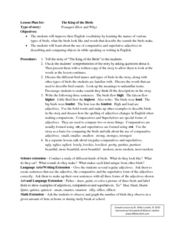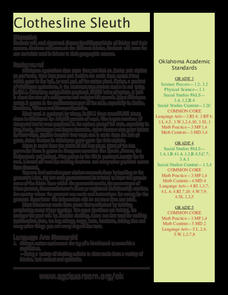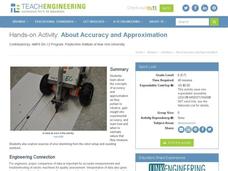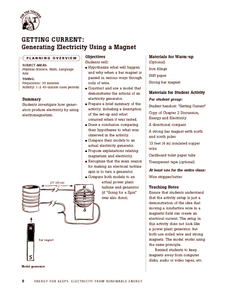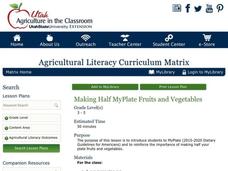Curated OER
Predicting the Future
Young scholars examine how scientists predict the effects of global climate change. In this environmental science lesson, students participate in a discussion about using computer generated data to create climate predictions. Young...
Curated OER
Aeronautics: Bernoulli's Principle
Students explore physics by participating in a science activity in class. In this flight properties lesson, students identify Bernoulli's principle of flight and his theory of statics and motion. Students conduct a demonstration by...
Curated OER
The King of the Birds vocabulary
Science and language skills come together in The King of the Birds. After reading, discuss the names and types of birds in the story and write given sentences to portray the difference between comparative and superlative adjectives....
Curated OER
Clothesline Sleuth
What fabrics are our clothes made of? Where do those fabrics from? Lead your pupils to discover the answers to these questions and more. Class members have a chance to play with various fabrics, invesitgating the materials and...
Baylor College
Fungus Among Us
In order to learn that mold spores can be found in the air, observers grow bread mold and make observations for a few days. Afterward, they participate in a class discussion to arrive at the knowledge that bread spores are present in the...
Teach Engineering
About Accuracy and Approximation
How accurate are robots? Groups draw lines by moving robots backwards and forwards by one rotation of the wheels. Using the appropriate formula, they determine the percent error in the length of the lines in relation to the calculated...
Baylor College
Post-Assessment: Global Atmospheric Change
Find out how much your earth scientists learned about the atmosphere in the unit on global atmospheric change with this assessment. After writing a letter to persuade others to make changes to protect our atmosphere, pupils take the same...
Teach Engineering
Alloy Advantage
Mix it up by using an intriguing resource that teaches young metallurgists that alloys are a metal mixture. They learn about the advantages of using alloys over pure metals and investigate titanium alloys as an example to finish the...
Curated OER
Moon Mining
Go on a moon mining expedition from the safety of your classroom with this space exploration simulation. Using simple models of the moon's surface prepared ahead of time by the teacher, young scientists are challenged with locating and...
Chicago Botanic Garden
Climate Change Around the World
Look at climate change around the world using graphical representations and a hands-on learning simulation specified to particular cities around the world. Using an interactive website, young scientists follow the provided...
University of Minnesota
Beautiful Brain: Do You See What I See?
Can art play tricks on your eyes, and can a still painting really appear to vibrate? The second lesson in a four-part series discusses the way our beautiful brains translate visual images. It highlights the style of optical art and...
University of Florida
Protecting Our Water Resources
Teach young environmentalists to protect their planet's resources with a set of interactive experiments. Kindergartners and other youngsters learn about watersheds and the water cycle, while older elementary learners focus on fertilizer...
Baylor College
Calculating Exponential Growth
There can be a steep learning curve when teaching about exponential growth, but the lesson helps kids make sense out of the concept. When talking about exponential growth of viruses, learners may not be very interested, but when you are...
Prince William Network
Migration Headache
During this game, kids become migratory shorebirds and fly among wintering, nesting, and stopover habitats. If they do not arrive at a suitable habitat on time, they do not survive. Catastrophic events are periodically introduced that...
Chicago Botanic Garden
Are You Bigfoot?
Scholars independently explore several websites to calculate their ecological footprint. Using their new found knowledge, they answer six short-answer questions and take part in a grand conversation with their peers about how...
Computer Science Unplugged
Lightest and Heaviest—Sorting Algorithms
How do computers sort data lists? Using eight unknown weights and a balance scale, groups determine the order of the weights from lightest to heaviest. A second worksheet provides the groups with other methods to order the weights. The...
Prince William Network
The Incredible Journey
Divide your school gym into breeding grounds and non-breeding grounds so that your zoologists can play a game simulating the seasonal migration of shorebirds. Players pick one of the included game cards and follow its directions, which...
Energy for Keeps
Getting Current: Generating Electricity Using a Magnet
Give your class a magnetic charge with this creative experiment designed to teach emerging scientists about electromagnetism. Pupils construct a model that demonstrates the function of an electrical generator and test this creation in a...
Education World
Predicting Pumpkins
If you want more pumpkin seeds, you should get a bigger pumpkin—right? Young harvesters use estimation skills to make a hypothesis about how many seeds they will find in a pumpkin before examining the real number inside.
Education Outside
Papermaking
Imagine recycling food scraps and using them to make paper. The directions are all here in a seven-page packet that details several paper-making strategies.
Agriculture in the Classroom
Making Half MyPlate Fruits and Vegetables
Establish healthy eating habits with a lesson focused around MyPlate's food recommendations and the importance of eating fruits and vegetables. Through class discussion and worksheet completion, scholars discuss the best choices of foods...
University of Wisconsin
Sizing a Rain Garden
Most appropriate if you are applying the entire unit to build a rain garden at your school, this installment involves calculating the area that will drain into it. Your garden planners will need data from previous lessons, so this one...
Curated OER
Rational Number Project
Infuse your unit on fractions, decimals, and operations with a thorough module about rational numbers. With a teaching guide, learner examples, templates for instruction, and lesson rationale, the module is a solid way to...
Visa
Rookie Lesson Module — Financial Football
Score a touchdown with an exciting game of financial football! Middle schoolers choose their favorite teams and play a virtual game of football as they answer various questions about economics.


